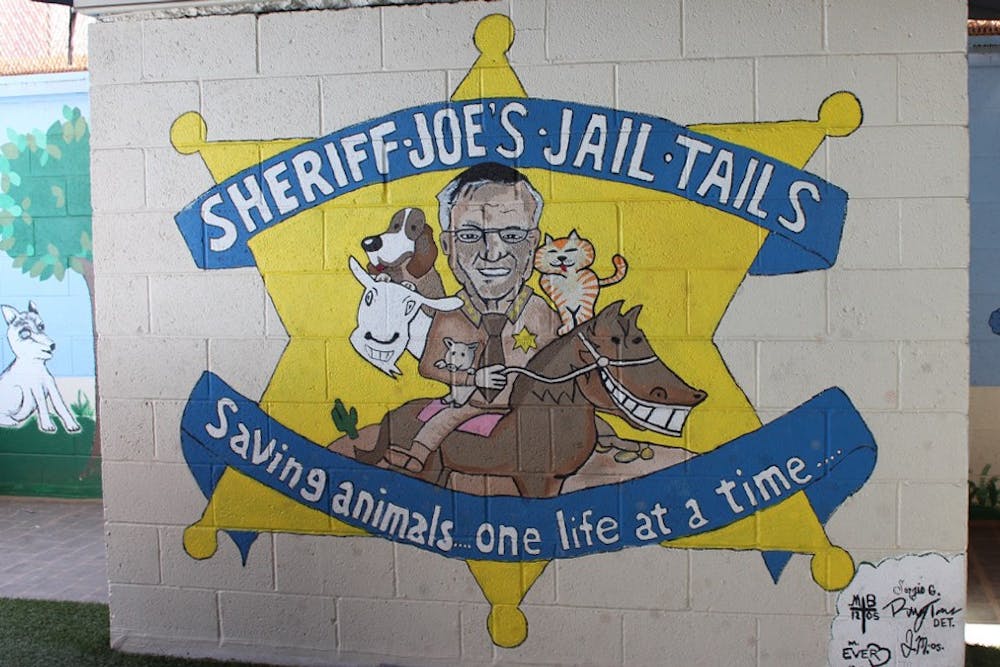The U.S. accounts for 5 percent of the world’s population, but incarcerates 25 percent of the world’s prisoners. As of 2014, the U.S. has 2.4 million people being held in prisons and jails across the country.
Many correctional facilities have taken on the role of rehabilitating their tenants by offering academic resources and teaching valuable social and work skills. Despite his hard media impression, Sheriff Joe Arpaio does run his facilities in a manner that would encourage rehabilitation. Inmates have access to adult education, substance abuse counseling and other community outreach programs.
Read more: Let's rethink the way we view prisoners and crime
One of Arpaio’s lesser-known improvements of Maricopa County is the Maricopa County Sheriff’s Office Animal Safe Haven, or the MASH Unit, in downtown Phoenix. The building that now houses MASH was known as the First Street Jail for 30 years before closing due to plumbing issues in 1999. Now, the same building that used to house inmates houses hundreds of abused and neglected pets.
The animals that find themselves in MASH have typically been rescued from criminal-degree animal cruelty cases, and at minimum, will stay in MASH until their owner’s trial concludes. However, it is nearly impossible for an animal that has spent time in MASH to ever return to its owners.
Arpaio has made it his mission to rescue the innocent animals of Maricopa County, and provide them with the opportunity to recover from their tragic backgrounds in a safe, no-kill environment.
While the shelter alone is an impressive accomplishment for "America’s Toughest Sheriff," the way it is operated is even more interesting. MASH is one of those community betterment programs that could be sacrificed at the polls if state funding was cut, but Arpaio found a way to ensure that MASH was costing Arizonans little to no tax money.
The MASH Unit is operated entirely by female inmates and their correction officers. The women wake up at 3 a.m. every morning to get ready and head over to the MASH unit from their respected facilities. There, the women are expected to feed the animals, clean their areas and assist in any further care of their four-legged friends.
While not all women are entirely fond of their work at MASH at first, they are taught basic job skills and some technical skills, such as animal grooming. Even more importantly, the inmates are responsible for helping the abused and neglected MASH tenants to learn to be animals again.
Most of those women have been victimized at one point, and these animals have seen hell. They’ve both been hurt, but they help each other heal.
Each year 7.6 million dogs and cats are surrendered to shelters across the country, and due to many preventable and unavoidable factors, that number does not appear to be declining any time soon. Unfortunately, the high incarceration rate is not expected to change much either in coming years. However, Arpaio may have been onto something when he implemented the MASH Unit.
All states should consider utilizing inmates in ways that benefit not just them, not just the prison, but the community as a whole. By taking responsibility of other living things, the inmates have the opportunity to feel important, learn to trust and be trusted, and live with compassion and empathy.
Unfortunately, this program would not be a great fit for every correctional facility, and not for every prisoner. Women who are chosen to work at the MASH Unit cannot have any crimes against children or animals on their record, among several other restrictions.
Arpaio is right to protect the animals from people with any potential to hurt them again, and if the rest of the country utilizes this model, they should uphold similar inmate restrictions. Fortunately, a large majority of incarcerated Americans are not behind bars for violent reasons.
We have the workforce, and if we can help the inmates help the animals, everyone wins.
Related links:
Prison Education Conference brings awareness to flawed system
ASU interns help combat recidivism with female leadership program in local prisons
Reach the columnist at Kendra.Penningroth@asu.edu or follow @KPenningroth on Twitter.
Like The State Press on Facebook and follow @statepress on Twitter.
Editor’s note: The opinions presented in this column are the author’s and do not imply any endorsement from The State Press or its editors.
Want to join the conversation? Send an email to opiniondesk.statepress@gmail.com. Keep letters under 300 words and be sure to include your university affiliation. Anonymity will not be granted.




